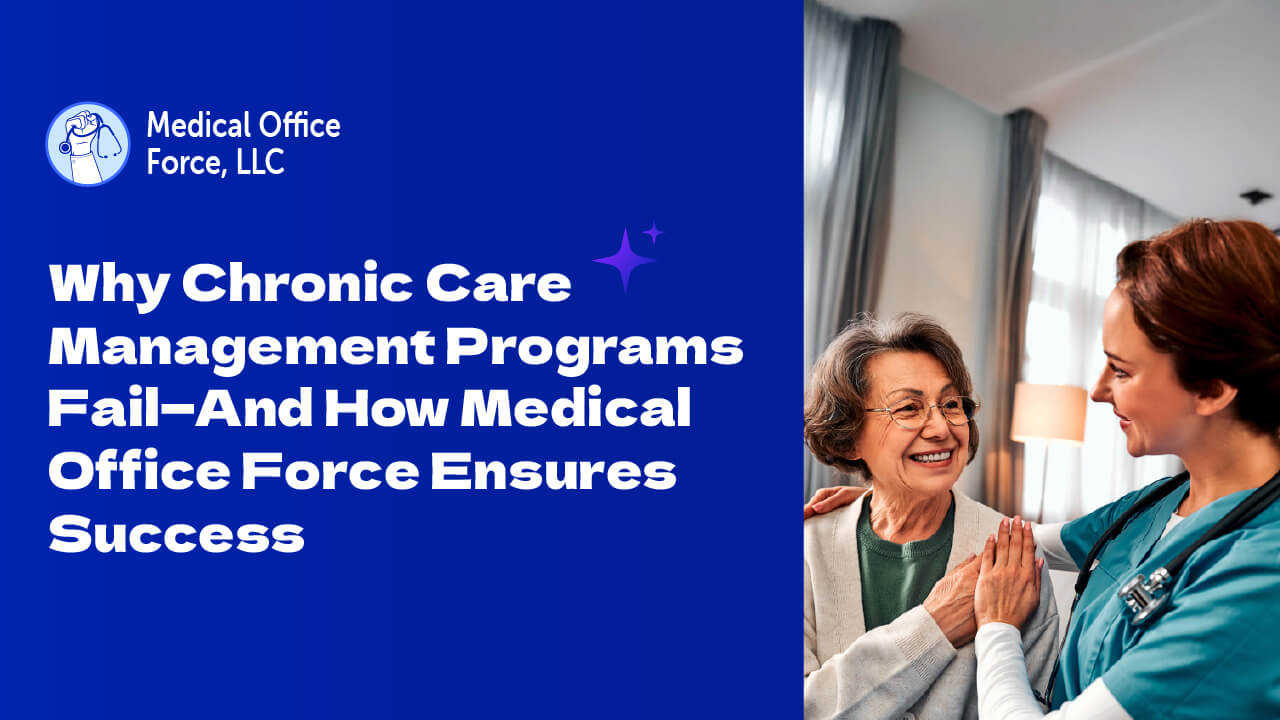
Introduction
Chronic Care Management (CCM) programs are designed to enhance care coordination and improve outcomes for patients with multiple chronic conditions. Despite their potential benefits, many CCM initiatives face challenges that hinder their effectiveness. Understanding these common pitfalls is essential for healthcare providers aiming to implement successful CCM services.
1. Insufficient Staffing and Resources
Effective CCM requires dedicated staff to manage patient care plans, monitor progress, and ensure compliance with program requirements. Many practices underestimate the resources needed, leading to overburdened staff and compromised patient care. A care manager may need to dedicate at least 20 minutes per patient per month, which can accumulate to significant time commitments when managing multiple patients.
How Medical Office Force Helps:
Medical Office Force offers virtual staffing solutions and streamlined workflows that alleviate the administrative burden on healthcare providers. By handling time tracking, care plan documentation, and patient communication, they enable practices to focus on delivering quality care without overextending their staff. Medical Office Force Medical Flow Medical Office Force
2. Lack of Patient Enrollment and Engagement
Identifying and enrolling eligible patients is a critical step in CCM. However, practices often fail to effectively communicate the benefits of the program, leading to low enrollment rates. Additionally, maintaining patient engagement over time is challenging, especially if patients do not perceive immediate benefits.

How Medical Office Force Helps:
Medical Office Force employs personalized outreach strategies and continuous engagement tools to educate patients about the benefits of Chronic Care Management (CCM). Their approach ensures higher enrollment rates and sustained patient participation, leading to better health outcomes. Medical Flow
3. Inadequate Understanding of Program Requirements
CCM programs have specific guidelines and documentation requirements set by the Centers for Medicare & Medicaid Services (CMS). A lack of understanding of these requirements can lead to non-compliance, billing issues, and ultimately, program failure. Proper training and education for staff are essential to navigate these complexities.
How Medical Office Force Helps:
With over 25 years of billing experience, Medical Office Force ensures accurate and timely billing by handling the appropriate CPT codes on behalf of partnered practices. The expertise minimizes compliance risks and optimizes revenue
4. Resistance to Change and Workflow Integration
Implementing CCM often requires changes to existing workflows and the adoption of new technologies. Staff may resist these changes, especially if they perceive them as adding to their workload without clear benefits. Without proper change management strategies, integrating CCM into daily operations can be problematic.
How Medical Office Force Helps:
Medical Office Force provides healthcare IT solutions that seamlessly integrate with existing systems, minimizing disruption. The user-friendly platforms facilitate smooth adoption, ensuring staff can efficiently manage CCM tasks without overhauling their current workflows. Medical Office Force
5. Technological Challenges
While Electronic Health Records (EHRs) are commonly used, they may not have the necessary functionalities to support CCM activities effectively. Specialized care management software can assist in time tracking, care plan development, and reporting. However, selecting and implementing the right technology requires careful planning and investment.

How Medical Office Force Helps:
The comprehensive digital solutions, including Remote Patient Monitoring and Telemedicine, are designed to enhance CCM services. These tools provide real-time patient data, streamline communication, and support proactive care management. Medical Office Force
6. Financial Considerations and Sustainability
The costs associated with CCM, including staffing, training, and technology, can be significant. Practices must assess the financial viability of CCM programs, considering potential reimbursements and long-term sustainability. Without a clear financial plan, programs may become unsustainable.
How Medical Office Force Helps:
By optimizing revenue cycle management and reducing claim denials, Medical Office Force enhances cash flow for healthcare providers. The services ensure that CCM programs are financially sustainable and contribute positively to the practice’s bottom line. Medical Office Force
7. Poor Communication and Coordination
Effective CCM relies on seamless communication among healthcare providers, patients, and care managers. Breakdowns in communication can lead to fragmented care, patient dissatisfaction, and reduced program effectiveness. Establishing clear communication protocols is essential for success.
How Medical Office Force Helps:
The integrated platforms facilitate real-time communication between all stakeholders involved in patient care. This ensures coordinated efforts, timely interventions, and a cohesive approach to managing chronic conditions.
8. High Patient Attrition Rates
Retaining patients in CCM programs is a common challenge. Factors such as lack of perceived value, inconvenience, or inadequate follow-up can lead to high dropout rates. Implementing strategies to enhance patient engagement and demonstrate the program’s benefits is crucial.
How Medical Office Force Helps:
Through consistent follow-ups, personalized care plans, and patient education, Medical Office Force enhances patient satisfaction and retention. The proactive approach ensures that patients remain engaged and committed to their care plans. Medical Office Force
9. Overlooking Compliance and Legal Aspects
Ensuring compliance with healthcare regulations and maintaining patient confidentiality are paramount in CCM. Neglecting these aspects can result in legal issues and damage to the practice’s reputation. Regular audits and adherence to best practices are necessary to mitigate risks.
How Medical Office Force Helps:
Medical Office Force stays abreast of regulatory changes and ensures that all CCM activities comply with current laws and standards. The meticulous attention to compliance safeguards practices against potential legal complications.
10. Absence of Continuous Evaluation and Improvement
Without ongoing assessment, CCM programs may fail to adapt to changing patient needs or healthcare landscapes. Implementing feedback mechanisms and performance metrics allows for continuous improvement and long-term success.
How Medical Office Force Helps:
We provide analytics and reporting tools that offer insights into program performance. These data-driven evaluations enable practices to make informed decisions, refine strategies, and enhance the effectiveness of their CCM programs.
Conclusion
Chronic Care Management programs hold significant promise for improving patient outcomes and reducing healthcare costs. However, success hinges on careful planning, adequate resources, effective communication, and continuous evaluation. By understanding and addressing the common pitfalls outlined above, and leveraging the comprehensive solutions offered by Medical Office Force, healthcare providers can enhance the effectiveness of their CCM programs and deliver better care to patients with chronic conditions.
At Medical Office Force, we understand the complexities of managing Chronic Care Management. From staffing support to compliance, billing, and patient engagement—we help you eliminate the barriers that lead most CCM programs to fail.
Book a free demo today and see how we can streamline your CCM operations, improve outcomes, and increase revenue.
👉 Request Your Free Demo Now
Let’s build a CCM program that works—for you and your patients.
Source:
This blog post incorporates information from reputable sources, including the Centers for Disease Control and Prevention, the Centers for Medicare & Medicaid Services.


For more information, write to contact@medicalofficeforce.com
Share Your Thoughts
No comments yet — be the first to comment!